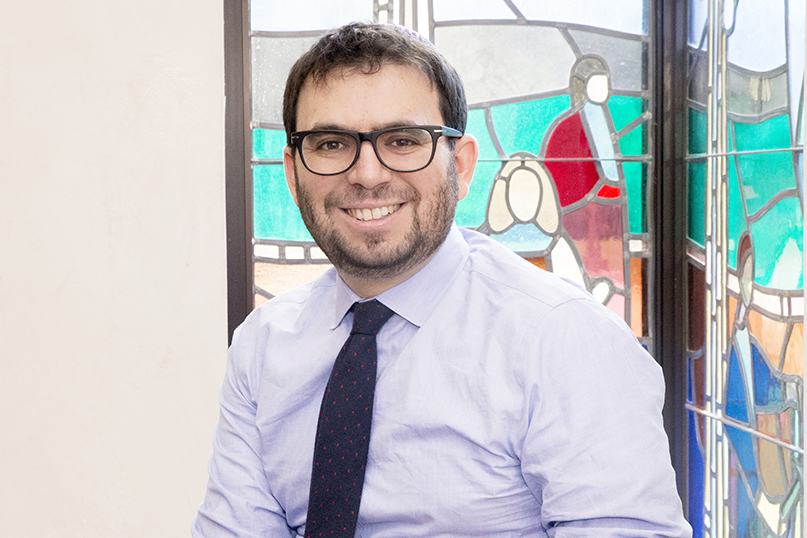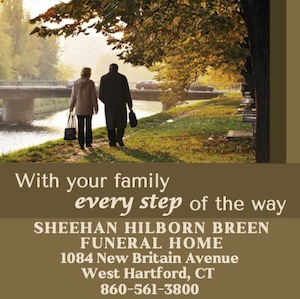
By Stacey Dresner
NEW HAVEN – Raised in an interfaith and mixed-race family in Los Angeles, Rabbi Eric Woodward says he knows “what it’s like to feel on the margins.”
His mother Lisa is an Ashkenazic Jew, and his father Michael was raised Catholic by his mother Maria who immigrated at the age of six to the U.S. from Oaxaca, a state in the south of Mexico.
“Something that’s been really important for me over the years is to be particularly welcoming to interfaith families, or to Jews of color or other people of color, or to connect to other non-Jewish communities that are near us. That’s a really important part of my rabbinate.
“People who have come from an interfaith background, whether that means that they’re the child of an interfaith relationship or they’re in an interfaith relationship, can sometimes feel less than,” he added. “So, I try to make sure that when I’m on the bimah I’m very transparent about growing up in an interfaith family because I think it’s important for people to feel that normalization is okay – that it’s really all right to be from this background.”
Rabbi Woodward will be expressing those ideas of acceptance and inclusion on the bimah of Congregation Beth El Keser Israel (BEKI) starting July 1 as the synagogue’s new rabbi.
Woodward has been working at BEKI remotely since the beginning of June while his two daughters finish school in Blue Bell, Pa. where he most recently served as senior rabbi of Tiferet Bet Israel. He is relocating to Westville with his wife, Katharine Baker, the publications director for the Rabbinical Assembly; and daughters, Ayelet, 8, and Tamar, 6.
Before BEKI’s rabbinical search committee began interviewing candidates for the rabbi position, the temple conducted a survey of the congregation and held focus group conversations to learn what BEKI members wanted in their next rabbi.
As it turned out, what they wanted in their next rabbi was everything Rabbi Eric Woodward has to offer.
“What was perhaps most thrilling to us as a committee was the number of congregants urging us to hire Rabbi Woodward. And not just giving him their vote but speaking with passion and excitement about having him as our new rabbi,” said Rachel Light, the search committee co-chair. “We did not go into this process expecting that there would be such an obvious choice. But when we heard this groundswell of passion and eagerness, imploring us to hire Rabbi Woodward, it was absolutely clear that we had found the right rabbi for BEKI.”
“From the moment we first interviewed him, Rabbi Woodward impressed me with his enthusiasm, his learning, and his basic decency,” committee member Mark Oppenheimer said. “This is a guy whose passion for Jews and Judaism comes through even over Zoom, which is pretty rare – almost as rare as the kind of consensus we got around his candidacy.”
It’s hard not to like Rabbi Eric Woodward; even after one phone conversation one feels like best buds with Woodward, whose sentences are peppered with the words “like” and “totally.”
But he is unapologetic about his California accent.
“I was born and raised in Los Angeles,” he explained. “LA is a great city, and it was really fun to live there in the ‘80s. I grew up in the San Fernando Valley, so I very much inherited all of the dialect patterns of the “Valley Girl” and I could never get it out of my system to say ‘like’ or ‘awesome.’ Using all of those words is just how I was raised.”
Both natives of Los Angeles, Rabbi Woodward’s parents met as students at UCLA.
His mother Lisa was raised in an assimilated Jewish household. “They belonged to a Reform synagogue, but they weren’t really connected [to Judaism] in any sort of deep way,” he said.
His father Michael grew up in a Catholic home (although he is non-practicing).
While Michael’s father was of Scotch-Irish descent – hence the Woodward surname – their home was based very much around his mother’s Mexican culture.
Rabbi Woodward and his brother Gregory grew up celebrating both Chanukah and Christmas. Growing up Woodward says he felt a deep connection to his Mexican roots, but he also attended a Reform synagogue where he had his bar mitzvah.
“I really, like, started connecting a little bit to the identity of being Jewish, but I always felt like maybe I wasn’t Jewish enough because my father wasn’t Jewish, and I was a little bit insecure about that,” he said. “Then like so many other people, after my bar mitzvah, I kind of checked out. Just sort of a normal teen thing.”
He headed to the East Coast to attend Williams College in Williamsport, Mass., where he majored in Religion.
“I realized that I had to actively choose to be Jewish there in order to connect to that part of myself. And that was actually really fun,” he recalled. “I realized that it wasn’t what my last name sounded like that made me Jewish or not but it was what I did with my time, and I started getting involved with the Jewish Center and taking classes in Jewish Studies.”
After getting his undergraduate degree, he went on to get his master’s in Jewish philosophy at the Jewish Theological Seminary.
“I realized that I really loved learning and I started to develop a Jewish spiritual vocabulary and realized that this stuff really mattered to me,” he said. “I thought I wanted to be an academic at first, but what I realized is that I liked schmoozing about Jewish texts, but I didn’t have the right temperament to actually be an academic. I had to kind of get that out of my system to know that I really wanted to be a rabbi. I really wanted to facilitate Jewish communities through ritual and story and text, and to help lift people up and be with people in all these different ways.”
Before rabbinical school, Woodward worked as a program director at a synagogue in his wife’s native Durham, N.C. He attended rabbinical school at JTS from 2007 to 2013, spending a year of that in Israel. Ordained in 2013, he then moved to Columbus, Ohio to serve as assistant rabbi at Congregation Tifereth Israel, before heading to the Philadelphia suburbs to work at Tiferet Bet Israel.
After leaving Philly last year, Rabbi Woodward applied for the job at BEKI as soon as it went up online
“What I was really looking for was a place that felt like, ‘Oh, this is my spiritual home, like this is a synagogue that I would want to be a member of and want to connect to.’ And I just got that vibe from BEKI right away,” he said. “It felt like a place that is serious about Judaism, but also unpretentious. It’s a place where they really value having love and warmth from the rabbi…It’s a place that really believes that Judaism has something to say about our place in the world today, politically and morally, and that wants to partner with other organizations to do tikkun olam – to make our world better. And then, there’s all the other stuff.”
The other stuff he refers to is all that makes New Haven special, like the fact that Yale University is nearby.
“We used to live in Durham where Duke is. I loved being in a shul in a university town. It’s really cool to deal with all of the academics and to be spiritually present for them. And I just really liked that, as soon as I started meeting the people at BEKI I just connected so much. I felt like gosh, ‘This is really the place for me.’ And I really feel like I sort of fell in love with them over the course of applying there. And I had heard the pizza there is really awesome.”
Which brings us to another of Rabbi Woodward’s passions – food.
“I’m super into food. I am a completely crazy, foodie person,” he said. “I have always known about New Haven pizza, so when I saw the job was in New Haven I thought, ‘Oh, this is awesome.’ And I read more about the city and its great food scene and culture scene, and that was very exciting.”
Rabbi Woodward also loves to cook and he cites his Mexican background for his interest in the culinary arts.
“I grew up not keeping kosher, and so many of the Mexican foods that I grew up with weren’t kosher, obviously. I realized as I started to keep kosher that if I wanted to have tamales, for example, I would have to learn to make them [kosher] myself.”
Now cooking and food have become his way of connecting to both his Jewish and Mexican roots.
“As I got really into cooking, I realized this is the way to connect to the best aspects of myself,” he explained. “I love cooking. I love all food. But I really enjoy cooking Mexican food and I try to cook Mexican food for Jewish holidays in ways that are meaningful. So, I try to make mole for Rosh Hashana. Mole is a traditional ground chili paste sauce from Mexico. Oaxaca, the state that my grandmother is from is known as the Land of the Seven Moles. It is like a very sort of traditional cultural food. Mole there is like what kugel is to Jews. It’s really deep and connecting.”
Rabbi Woodward’s deep roots – both Jewish and Mexican – are never far from his thoughts.
He recalls reading an article a few years ago about young children who were in danger of being deported when Donald Trump attempted to terminate DACA – Deferred Action for Childhood Arrivals.
“One was a girl who came here at the age of six or seven from Oaxaca, and I realized that’s exactly what my grandmother was, even though it was in 1926 as opposed to 2017,” he said.
That parallel between his grandmother and a young DACA “dreamer” hit home for Woodward, but he was already looking toward how he could help various vulnerable communities. In 2012 he was a part of an American Jewish World Service clergy delegation to Muchucuxcah, a Mayan village in the Mexican Yucatan.
Early on, he knew that their goals were the same.
“It was so clear that the BEKI does so many things that were about Jewish values and about taking care of the vulnerable and needy. And it was very clearly not just words from them, but it was really who they were in a deep way.”
Main Photo: Rabbi Eric Woodward








 Southern New England Jewish Ledger
Southern New England Jewish Ledger









